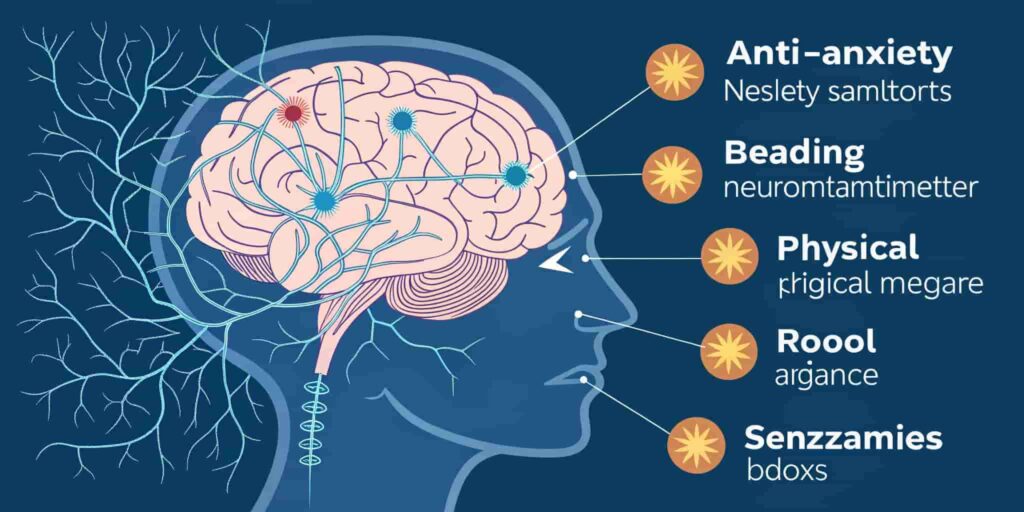Living with anxiety can be overwhelming. It often feels like an invisible weight you carry every day, making it hard to focus on the present or enjoy life as fully as you deserve. Fortunately, there’s a wide range of medications that can help people manage anxiety and regain control over their lives. This guide will break down the many different types of anti-anxiety drugs available, providing a clear explanation of each medication, how it works, and who it’s best suited for.
The Anti Anxiety Drugs List Alphabetical offers an organized overview of the most common anti-anxiety medications, from SSRIs to benzodiazepines. By exploring this list, you’ll gain valuable insights on when and why each drug is used and what to expect while taking them. Whether you’re considering medication for the first time or looking to understand the options more clearly, this guide has you covered.
What Is Anxiety, And How Can Medication Help?
Anxiety is a natural response to stress, but when it becomes chronic, it can interfere with daily life. For some people, anxiety is more than just occasional worry or nervousness—it can take the form of intense panic attacks, constant worrying, and even physical symptoms like a racing heart, dizziness, or shortness of breath.

In the United States, anxiety disorders are among the most common mental health issues, affecting nearly 20% of the population every year. While therapy and lifestyle changes are often the first line of treatment, medication can play an important role for many people.
It helps by reducing symptoms and making it easier for individuals to engage in their daily activities, manage their emotions, and start to feel more like themselves again. If you’re reading this, you might be wondering what medications are available to help ease anxiety and which one could be right for you. That’s exactly what we’re here to explore!
Types Of Anti Anxiety Medications – Need To Know!
There are several types of medications that can help manage anxiety. The main goal of these drugs is to either calm the nervous system, balance mood-regulating chemicals in the brain, or block the physical symptoms of anxiety. Let’s break down the most common types of medications prescribed for anxiety.
Benzodiazepines: Fast-Acting Relief
Benzodiazepines are often prescribed when someone needs fast relief from anxiety symptoms. These medications work by enhancing the effects of GABA, a calming neurotransmitter in the brain. Medications like Xanax (Alprazolam), Valium (Diazepam), and Klonopin (Clonazepam) fall into this category.
While they’re effective at providing quick relief, they are typically only prescribed for short-term use because they can lead to dependence or withdrawal symptoms if taken for a long period.
SSRIs (Selective Serotonin Reuptake Inhibitors): Long-Term Treatment
SSRIs are one of the most commonly prescribed medications for long-term anxiety management. These medications, such as Lexapro (Escitalopram), Prozac (Fluoxetine), and Zoloft (Sertraline), work by increasing serotonin levels in the brain. Serotonin is a neurotransmitter that helps regulate mood, sleep, and anxiety levels.
SSRIs are generally safe for long-term use, though they can take several weeks to start working. They’re especially helpful for generalized anxiety disorder (GAD) and social anxiety.
SNRIs (Serotonin-Norepinephrine Reuptake Inhibitors): A Dual Approach
Similar to SSRIs, SNRIs (like Cymbalta (Duloxetine) and Effexor (Venlafaxine)) work by increasing serotonin levels in the brain, but they also boost the levels of norepinephrine—a neurotransmitter that helps with stress regulation. This makes SNRIs effective for treating both depression and anxiety.
Buspirone: A Non-Sedating Option
For people who need a medication without the sedating effects of benzodiazepines, Buspirone (BuSpar) is a great option. It’s effective for managing generalized anxiety disorder (GAD) and works by balancing serotonin and dopamine in the brain. Unlike other anti-anxiety drugs, buspirone doesn’t cause sedation or dependency, making it a safer long-term option for some people.
Alphabetical List Of Anti Anxiety Drugs – Find The Best Medications!

Alprazolam (Xanax):
- Class: Benzodiazepine
- How it works: Enhances the effects of GABA, a neurotransmitter that inhibits brain activity, leading to a calming effect.
- Uses: Short-term relief for panic attacks, generalized anxiety disorder (GAD), and social anxiety.
- Side effects: Drowsiness, dizziness, memory issues, and potential for dependence.
- Warnings: Risk of addiction, withdrawal symptoms with long-term use.
Buspirone (BuSpar):
- Class: Azapirone
- How it works: Acts on serotonin receptors in the brain to help reduce anxiety.
- Uses: Primarily used for generalized anxiety disorder (GAD).
- Side effects: Dizziness, nausea, headaches, and nervousness.
- Warnings: Can take several weeks to feel its full effect, no risk of dependence.
Clonazepam (Klonopin):
- Class: Benzodiazepine
- How it works: Enhances GABA activity, leading to a calming effect on the nervous system.
- Uses: Treatment for panic disorder, generalized anxiety disorder, and seizure disorders.
- Side effects: Drowsiness, dizziness, impaired coordination, and memory problems.
- Warnings: Risk of dependence and withdrawal with long-term use.
Diazepam (Valium):
- Class: Benzodiazepine
- How it works: Increases GABA activity, promoting relaxation and reducing anxiety.
- Uses: Used for short-term relief of anxiety, muscle spasms, and alcohol withdrawal symptoms.
- Side effects: Drowsiness, fatigue, dizziness, and muscle weakness.
- Warnings: Potential for abuse, addiction, and withdrawal symptoms.
Duloxetine (Cymbalta):
- Class: SNRI (Serotonin-Norepinephrine Reuptake Inhibitor)
- How it works: Increases both serotonin and norepinephrine in the brain, which helps improve mood and reduce anxiety.
- Uses: Generalized anxiety disorder (GAD), depression, and chronic pain.
- Side effects: Nausea, dry mouth, dizziness, and fatigue.
- Warnings: May increase the risk of suicidal thoughts in young adults.
Escitalopram (Lexapro):
- Class: SSRI (Selective Serotonin Reuptake Inhibitor)
- How it works: Boosts serotonin levels in the brain to help regulate mood and anxiety.
- Uses: Used for generalized anxiety disorder (GAD), social anxiety disorder, and depression.
- Side effects: Insomnia, sexual dysfunction, dry mouth, and weight gain.
- Warnings: Can increase suicidal thoughts in children, teens, and young adults.
Fluoxetine (Prozac):
- Class: SSRI
- How it works: Increases serotonin activity in the brain, helping to stabilize mood and reduce anxiety.
- Uses: Used to treat generalized anxiety disorder, depression, and panic disorder.
- Side effects: Insomnia, sexual dysfunction, nausea, and anxiety at the start of treatment.
- Warnings: May increase the risk of suicidal thoughts in young adults.
Hydroxyzine (Vistaril):
- Class: Antihistamine
- How it works: Acts as a sedative and helps calm the nervous system by blocking histamine receptors.
- Uses: Short-term relief of anxiety, often used for acute anxiety or anxiety before medical procedures.
- Side effects: Drowsiness, dry mouth, and dizziness.
- Warnings: Not suitable for long-term use due to sedative effects.
Lorazepam (Ativan):
- Class: Benzodiazepine
- How it works: Increases the calming effects of GABA in the brain.
- Uses: Short-term treatment of anxiety and panic disorders.
- Side effects: Drowsiness, dizziness, and memory problems.
- Warnings: Potential for dependence and withdrawal symptoms with long-term use.
Paroxetine (Paxil):
- Class: SSRI
- How it works: Increases serotonin levels in the brain, helping to reduce anxiety and depression.
- Uses: Generalized anxiety disorder (GAD), social anxiety disorder, and panic disorder.
- Side effects: Weight gain, sexual dysfunction, drowsiness, and nausea.
- Warnings: Increased risk of suicidal thoughts in younger people.
Sertraline (Zoloft):
- Class: SSRI
- How it works: Boosts serotonin levels to help manage anxiety and depression.
- Uses: Used to treat generalized anxiety disorder, panic disorder, and social anxiety.
- Side effects: Insomnia, sexual dysfunction, dry mouth, and dizziness.
- Warnings: May increase the risk of suicidal thoughts in children and young adults.
Venlafaxine (Effexor):
- Class: SNRI
- How it works: Increases both serotonin and norepinephrine levels to improve mood and reduce anxiety.
- Uses: Treats generalized anxiety disorder, panic disorder, and social anxiety disorder.
- Side effects: Nausea, dry mouth, dizziness, and sweating.
- Warnings: Can cause withdrawal symptoms if stopped suddenly; increased risk of suicidal thoughts in young people.
How Do Anti Anxiety Drugs Work?
The brain is constantly sending signals between neurons (nerve cells) using neurotransmitters. In people with anxiety, certain neurotransmitters can become imbalanced, leading to feelings of fear, worry, and physical symptoms like a rapid heartbeat.

Most anti-anxiety drugs work by regulating these neurotransmitters to restore balance. For example, benzodiazepines enhance GABA, a neurotransmitter that has a calming effect, while SSRIs and SNRIs increase serotonin, which helps with mood regulation.
Cost And Insurance Considerations – Affordable Anxiety Treatment Options!
| Treatment Type | Cost Range | Details |
|---|---|---|
| Generic Medications | $4 – $15 per month | Generally affordable, generic options like Sertraline (Zoloft) or Alprazolam (Xanax). |
| Brand-Name Medications | $50 – $150 per month | Higher cost, depending on the brand and medication (e.g., Xanax or Lexapro). |
| Insurance Co-Pay (Generic) | $10 – $50 per month | Depending on your insurance plan and drug formulary. |
| Insurance Co-Pay (Brand-Name) | $100+ per month | Higher co-pays for brand-name drugs under most insurance plans. |
| Out-of-Pocket Costs (Generic) | $10 – $30 per month | If paying without insurance, generic medications are the most affordable option. |
| Out-of-Pocket Costs (Brand-Name) | $100 – $300 per month | Brand-name medications can be costly without insurance. |
| Patient Assistance Programs | 50% – 80% discount | Offered by pharmaceutical companies to lower the cost of medications, especially for those without insurance. |
| Therapy (Cognitive Behavioral Therapy) | $75 – $200 per session | Therapy costs depend on location and therapist experience. Insurance may help cover these. |
Choosing The Right Medication For You – How To Treat Your Anxiety!
When it comes to choosing the right anti-anxiety medication, there is no “one-size-fits-all” solution. The decision depends on various factors, including the type of anxiety disorder you have, the severity of your symptoms, your medical history, and your personal preferences. Here are some key considerations to help guide the process:
Type Of Anxiety Disorder:
Different medications are more effective for different types of anxiety. For example, benzodiazepines like Alprazolam (Xanax) are often prescribed for short-term panic attacks, while SSRIs like Escitalopram (Lexapro) are commonly used for generalized anxiety disorder (GAD) and long-term anxiety management.
Effectiveness:
Some medications work faster than others. Benzodiazepines provide quick relief for acute symptoms, but they come with the risk of dependence and are typically used for short periods. On the other hand, SSRIs and SNRIs take several weeks to show results but are more suitable for long-term management of anxiety disorders.
Side Effects:
Every medication has potential side effects, so it’s crucial to weigh the benefits against any possible drawbacks. For instance, SSRIs may cause sexual dysfunction or weight gain, while benzodiazepines may lead to drowsiness or memory problems. Your healthcare provider will help you find the medication with the fewest side effects that works best for your symptoms.
Personal Health History:
If you have a history of substance abuse, benzodiazepines might not be the best choice due to their potential for addiction. Similarly, if you have liver or kidney problems, certain medications may need to be avoided or dosed differently.
Combination with Therapy:
Medication is often most effective when combined with therapy. Cognitive Behavioral Therapy (CBT) or other forms of therapy can help you build coping skills and reduce reliance on medication over time.
Trial and Error:
It may take some time to find the right medication and dosage. Working closely with your healthcare provider will help ensure you’re on the right track, and adjustments can be made based on your response.
What Are The Side Effects Of Anti-Anxiety Medications?
- Weight Changes: Some anti-anxiety medications may cause weight gain or loss. Discuss these changes with your healthcare provider if they concern you.
- Dependence and Withdrawal (Benzodiazepines): Medications like Xanax can cause dependence, leading to withdrawal symptoms like anxiety and tremors if stopped suddenly. It’s crucial to taper off these drugs under medical supervision.
- Gastrointestinal Issues: SSRIs and SNRIs may cause nausea, diarrhea, or constipation. These issues typically improve over time, but adjustments to dosage can help alleviate discomfort.
- Sexual Dysfunction: Medications like Prozac may lead to decreased libido or erectile dysfunction. These effects can often be managed with dosage adjustments or changing medications.
- Drowsiness and Sedation: Drugs like Hydroxyzine may cause drowsiness. Avoid activities like driving until you understand how the medication affects you.
- Increased Risk of Suicidal Thoughts: SSRIs and SNRIs can increase suicidal thoughts, especially in younger people. Close monitoring is necessary, especially during the first few weeks of treatment.
Natural Alternatives And Therapies – Effective Ways To Manage Anxiety!
While medications can be highly effective in treating anxiety, some individuals may prefer natural alternatives or complementary therapies. These approaches may help manage anxiety without the side effects associated with prescription drugs. Here are some popular natural alternatives:

Herbal Supplements:
Certain herbs are believed to have calming effects that may help reduce anxiety. Lavender, chamomile, and passionflower are often used to promote relaxation and improve sleep. It’s important to consult with a healthcare provider before using herbal supplements, as they may interact with other medications.
Cognitive Behavioral Therapy (CBT):
CBT is a well-established, non-medication approach that focuses on changing negative thought patterns and behaviors that contribute to anxiety. It’s an effective long-term treatment option that can help individuals cope with anxiety in daily life, often reducing or eliminating the need for medication.
Mindfulness And Meditation:
Practices like mindfulness meditation help you stay present and calm the mind, reducing anxious thoughts. Techniques like deep breathing, body scanning, and guided imagery are commonly used to lower stress levels and promote emotional well-being.
Exercise:
Regular physical activity, such as walking, running, or yoga, can help reduce symptoms of anxiety by releasing endorphins, which improve mood and promote relaxation. Exercise also helps manage stress, improves sleep quality, and boosts overall mental health.
Aromatherapy:
Essential oils, like lavender and bergamot, are used in aromatherapy to reduce anxiety and stress. These oils can be diffused, applied to the skin (when diluted), or added to a warm bath. Aromatherapy has a soothing effect that can help manage mild anxiety and improve relaxation.
Dietary Changes:
A balanced diet rich in omega-3 fatty acids, magnesium, and B vitamins may help reduce anxiety symptoms. Limiting caffeine, alcohol, and sugar can also help stabilize mood and reduce nervous energy, as these substances can exacerbate anxiety.
FAQs:
Are benzodiazepines safe for long-term use?
While benzodiazepines like Xanax provide quick relief from anxiety, they are generally not recommended for long-term use due to the risk of dependence and withdrawal. They are best used for short-term or occasional anxiety management.
Can anti-anxiety medications be addictive?
Yes, some anti-anxiety medications, especially benzodiazepines, carry the risk of addiction if used improperly or for extended periods. Doctors typically prescribe them only for short-term use and monitor patients closely.
How long does it take for anti-anxiety medications to work?
Medications like SSRIs and SNRIs may take 2 to 6 weeks to show full effects, as they gradually adjust serotonin and norepinephrine levels in the brain. Benzodiazepines, on the other hand, can provide rapid relief within hours or even minutes.
What is the difference between SSRIs and SNRIs?
SSRIs primarily focus on increasing serotonin levels, while SNRIs increase both serotonin and norepinephrine levels. SNRIs may be more effective for individuals who also experience symptoms of depression along with anxiety.
Can I take anti-anxiety medications with other medications?
It’s important to consult your doctor before combining medications, as there could be interactions between anti-anxiety drugs and other prescriptions, such as antidepressants, painkillers, or blood thinners. Your doctor will ensure your medications are safe to take together.
What happens if I miss a dose of my anti-anxiety medication?
If you miss a dose, take it as soon as you remember unless it’s almost time for your next dose. Do not double the dose to make up for the missed one, as this can increase the risk of side effects. Always follow your doctor’s instructions for missed doses.
Conclusion:
The Anti-Anxiety Drugs List Alphabetical provides a comprehensive overview of the various medications available for managing anxiety, from SSRIs and SNRIs to benzodiazepines and natural alternatives. Choosing the right medication depends on individual needs, preferences, and medical history.
It’s crucial to consult a healthcare provider to determine the most effective treatment. While medications can be an essential part of managing anxiety, combining them with therapy and lifestyle changes often leads to the best outcomes. Always consider side effects, costs, and risks when making decisions about anxiety treatment.
Also Read:








Leave a Reply